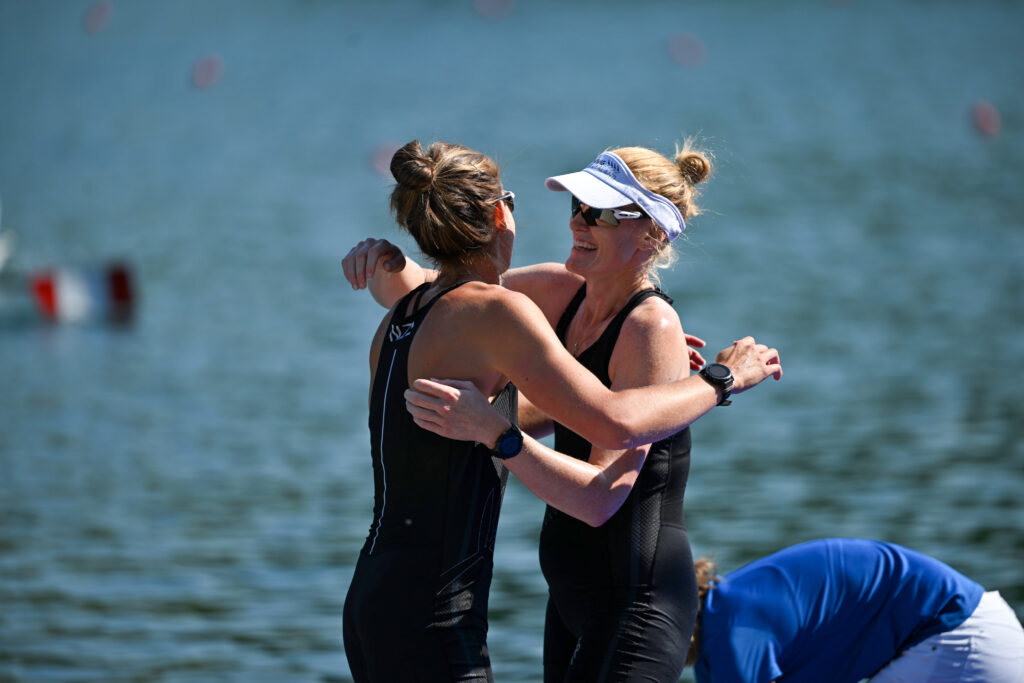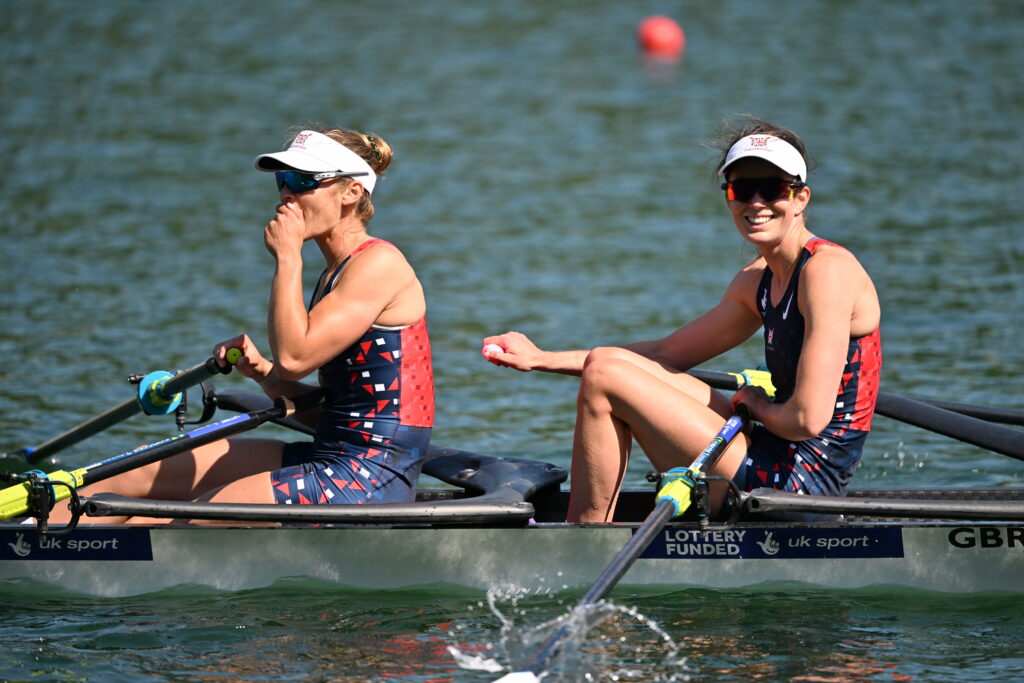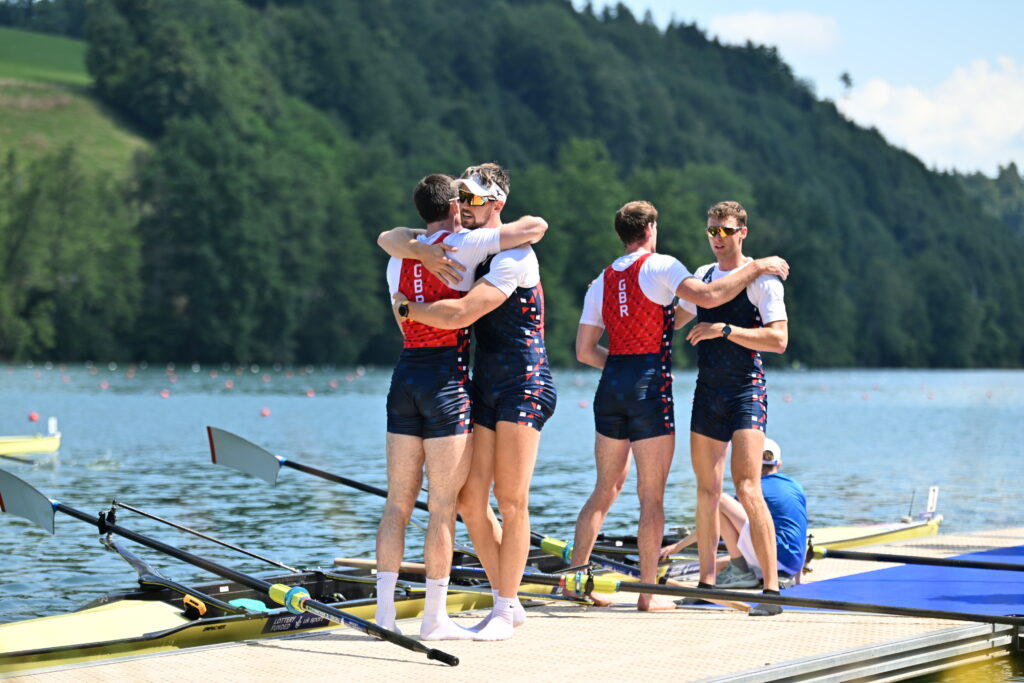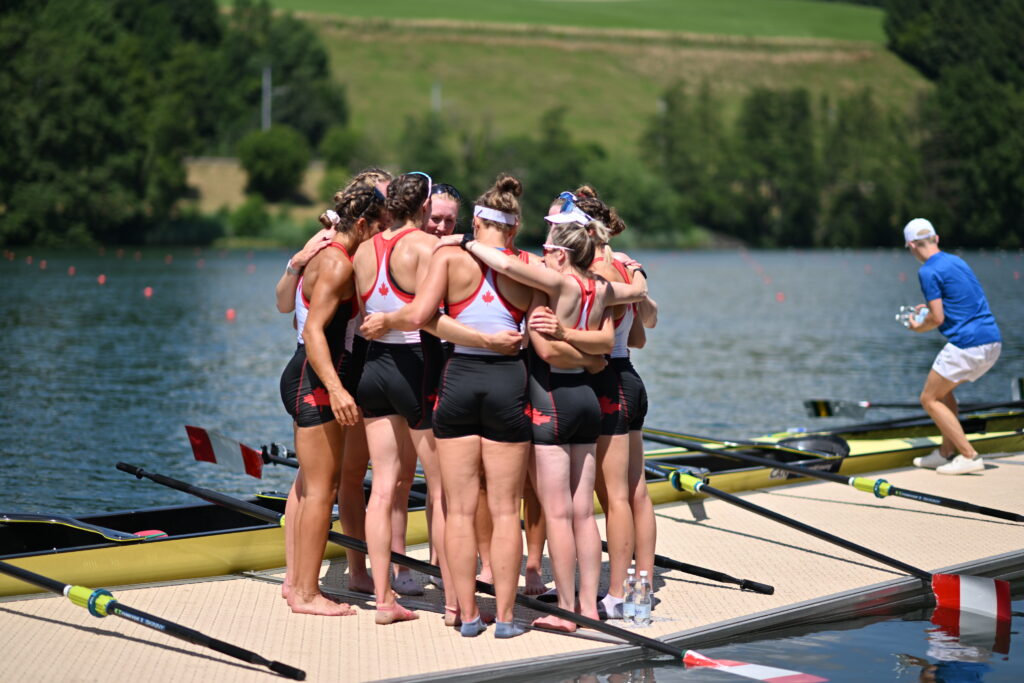
10 Jul 2022
Tight margins in finals at the 2022 World Rowing Cup III in Lucerne
After a series of exciting B Finals, the medal races of the third and final World Rowing Cup of the 2022 Season got underway on Lucerne’s Rotsee. After record times were clocked in the non-Olympic finals a day earlier, hopes were high for fast and furious racing. Conditions were good with a slight tail wind on the course.
Women’s pair (W2-) – Final
The Canadians went off with a high rating, but it was the experienced Kiwi pair of Grace Prendergast and Kerri Williams that took the early lead. The British pair of Emily Ford and Esme Booth kept them under pressure throughout though, with Romania in third place at the halfway marker. In the third quarter of the race, the Brits were digging in and trying to close up on the lead that New Zealand had established. Romania was rating slightly higher than Great Britain but not making up ground. There was clear water back to the rest of the field and the top three looked pretty set as the pairs came into the final stages of the race. The Romanians had a great final sprint, overtaking Great Britain and also putting New Zealand under serious pressure. After a photo finish, it was confirmed that Prendergast and Williams had held on to take the first gold medal of the day.

Result: NZL, ROU, GBR, CZE, CRO, CAN
Esme Booth, Women’s Pair, Great Britain, Bronze:
“We’re very pleased with the bronze medal, stepped up from that race on Friday We stroked too hard in middle, payed for it in the end – but rowing against New Zealand was very exciting. We’re now going back to training camp before august and the Europeans.”
Kerri Williams, Women’s Pair, Gold, New Zealand:
“It was pretty hard, we’ve been training a lot for the past month. It means a lot to be back, missed it for a few years and being back in Lucerne is very nice. It is really exciting and fun being back in the boat even with very strong pressure, really excited to getting into training and having more time in the boat.”
Men’s pair (M2-) – Final
The new pairing from Australia established the early lead in this final and crossed the 500m timing point first but only narrowly ahead of the remaining crews. Australia still held the lead at 1,000m, but Great Britain1 was then the fastest moving boat and started to try the gap. In the third quarter, New Zealand was also trying to make an impact and the British were starting to make a move and eat into the early lead that had been established by Australia. In the final quarter, Great Britain1 started to draw level with Australia with Spain and Serbia also charging. Australia appeared to run out of gas in the closing stages and Great Britain1 moved into the lead. Serbia was still charging but Australia were doing everything they could to hold on to the silver medal.
Result: GBR1, AUS1, SRB, NZL, GBR2, ESP
Tom George, Men’s Pair, Great Britain, Gold:
“We’ve been learning a lot this year, this is our first year in this boat class. But we’ve also learned a lot since last weekend and Henley Royal Regatta, we’re pleased to see good results. In the previous races we have been going out very hard, it helped get some confidence, we tried it out in Henley and got blown out, tried it out today and worked out good!”
Alexander Hill, Men’s Pair, Australia, Silver:
It was a pretty fast race, we really enjoyed competing again, really exciting. We knew the British would come out really strong, so we had to start really strong and keep up. We will see how things will go from here, lots of preparation to be done.”
Lightweight women’s double sculls (LW2x) – Final
Great Britain went through the 500m marker first leading by a canvas over the reigning Olympic gold and silver medalists. In the second 500m, the British crew looked really relaxed and just started to edge out slightly more ahead of France approaching the 1,000m with Italy sitting in third place. In the third quarter, Great Britain started to extend their lead looking to try and establish clear water over France and Italy. Meanwhile, Poland1 was trying to make a move and close the gap on China, who were sitting in fourth place. Inside the red buoys, France started to really put the pressure on Great Britain, but Arlett and Craig were able to respond and hold off the charge. The two crews were well clear of the rest of the field with Italy managing to hold off China to take bronze.
 Result: GBR, FRA, ITA, CHN, POL2, POL1
Result: GBR, FRA, ITA, CHN, POL2, POL1
Maddie Arlett, Lightweight Women’s Double Sculls, Great Britain, Gold:
“Unbelievable, can’t believe I’m standing between the medalists! It feels really good coming back to the international circuit and I believe we’ve done a fantastic job.”
Claire Bové, Lightweight Women’s Double Sculls, France, Silver:
“It was a beautiful race, we’re happy with the result because it is our first big international race since Tokyo. We are now shifting our focus towards Munich in a few weeks, take more and more pleasure to row and race again.”
Lightweight men’s double sculls (LM2x) – Final
France blasted out of the blocks trying to establish an early lead and they were first to the 500m but Switzerland, Italy2 and Italy1 were all hot on the heels and it was obvious that we were in for an exciting race. By 1,000m, there was four crews nearly all in a line. As the cheers came in for the Swiss crew, they moved into the lead and had to grit their teeth as they faced serious pressure from the Italian boats. Switzerland maintained the narrowest of leads going into the final quarter of the race, but the medals were far from set. Italy were looking across, trying to reel into the Swiss and in the final stages, Italy2 went into the lead with Italy1 following too. Norway was also challenging and the Swiss couldn’t match the charge and, despite leading for the majority of the race, missed out on a podium place altogether.
Result: ITA2, ITA1, NOR1, FRA, SUI, POL
Gabriel Soares, Lightweight Men’s Double Sculls, Gold:
“We didn’t expect to go so strong! It is a pleasure to row with Pietro, we expected a medal but not first place,- we started preparing this double only a week ago. Every coach and ex rower says Lucerne is an amazing race and we can confirm!”
Lars Benske, Lightweight Men’s Double Sculls, Norway, Bronze:
“We’re so tired! Races in this boat class are very hard and heavy on the body. But we’re happy with the result.”
Women’s quadruple sculls (W4x) – Final
China2 established half a canvas lead over Germany in the very early stages of the race, despite an impressive start from Germany. Great Britain and Poland were also well within the mix. China2 passed the 500m marker first, almost two seconds ahead of Great Britain with Poland sitting in third place. In the second quarter of the race, China2 started to open up a slightly bigger lead and there was very little to call between the three crews behind them. By halfway, China2 had a clear water lead, but it was still all to play for between three crews racing for silver and gold. China held on to their comfortable lead in the last quarter, even when Great Britain looked to find a bit of extra gas. Italy had overlap, but the British looked cool and calm and managed to hold on to the silver medal. It was another dominant display by China to take gold.
Result: CHN2, GBR, ITA, POL, ROU, GER
Kyra Edwards, Women’s Quadruple Sculls, Great Britain, Silver:
“We’re tired but glad everything went well, it was such a good race, everything went how we wanted. we didn’t have much time to get a team together and train. Gold would have been nice, but Chinese are very strong. We’re aiming for first next race!”
Men’s four (M4-) – Final
Romania went out of the blocks at 50 strokes per minute to try and make an impression on Australia1. However, whilst it was Australia1 first through the 500m, Great Britain was the fastest moving boat on the water and it was clear they were keen to get revenge after Australia won at Henley Royal Regatta by just 1 foot last week. Australia held the lead by half a length at halfway with Romania sitting in third position; it was certainly too early to write them off. The British were slightly more conservative on the stroke rate, but very efficient. Australia, who had not dipped below 40 strokes per minute, was starting to open up more of a lead and it was clear that the British needed to make a move. Inside the red buoys, the British seemed to find some extra speed and Australia just couldn’t match it. Australia was also coming under pressure from Romania and whilst there was no doubt about the winners, there was a photo finish for the silver medal.

Result: GBR, AUS1, ROU, GER, ITA2, ITA1
William Stewart, Men’s Four, Great Britain, Gold:
“We managed to stay in our bubble, stay focused on the job, we’ve been really working hard back at home and managed to execute today. We found a lot of speed this last week and managed to perform well. We had a slower start than what we wanted but kept our pace, good sprint at the end and during the race got to the first place inch by inch.”
Spencer Turrin, Men’s Four, Australia, Silver:
“We will need to think about what we’ll be doing from here. We had a good start to the race but the end wasn’t as good. We will now be heading back to Australia for a training block and see what are our targets before the world champs.”
Women’s single sculls (W1x) – Final
China’s Ling Zhang was the fastest sculler off the start, and held the lead to 500m. The only boat not keeping up with the pace in the first quarter was Diana Dymchenko. Zhang was still sitting in first place at halfway, with a slight lead over Switzerland’s Jeanine Gmelin and Australia’s Tara Rigney sitting in third. In the third quarter, Gmelin was starting to make her move and it was definitely too early to ignore Rigney. It looked like Zhang couldn’t answer the challenge from Gmelin as the cheers from the Swiss supporters started to increase approaching the finish. Gmelin moved into the lead and Rigney was coming with her. Gmelin had to respond again and step her rating up a couple of pips. Both boats were moving at the speed but meanwhile, Germany’s Alexandra Foester had appeared from nowhere and went into the lead. There was shock in the stands after the incredible finish from Foester.
Result: GER, AUS2, SUI1, AZE, CHN1, FRA1
Alexandra Foester, Womens’ Single Sculls, Germany, Gold:
“Overwhelming to get the win, it was very unexpected but I’m very happy. It’s a great feeling to win here in Lucerne. I’m at a short for words, it just shows how glad I am”
Tara Rigney, Australia, Women’s Single Sculls, Silver:
“I stuck to the race plan hoping for the best, I enjoyed the race doing my own thing – I found out on Thursday that I was rowing in the singles ! It was really tough, being alone on the boat is tough but I would be really keen to race at the world championships, work by myself and with the team. Looking forward to the challenge!”
Men’s single sculls (M1x) – Final
Spain’s Jordi Jofre Senciales blasted off the start but French sculler Matthieu Androdias was going with him. Great Britain’s Graeme Thomas was also well within the mix. In the second quarter, the expected battle between France and Great Britain started to unfold whilst Senciales seemed to fade. Thomas was first through the 1,000m and was starting to establish a comfortable position with 1/4 lead whilst Bulgaria’s Kristian Vasilev had moved into second place. Thomas was looking relaxed and smooth but Vasilev was not letting him get away. Germany’s Marc Weber had moved into third place. Thomas was sprinting to the line and holding off any charge from Vasilev. It was a very impressive from Graeme Thomas with excellent speed in the last 500m to win him the gold.
Result: GBR, BUL, GER2, CAN, ESP, FRA1
Graeme Thomas, Men’s Single Sculls, Great Britain, Gold:
“We talked a lot about Tokyo and the disappointment for the whole team. We made lots of changes and results were seen in Belgrade – we have to give a lot of credit to the coaches. I never won a World Cup in the singles, winning in singles isn’t an easy task so I’m very happy. It was one of my fastest races, great to be pushed by everybody. It’s a mental challenge, how to go get that extra 1 percent and stick to the plan. And it worked.”
Marc Weber, Germany, Men’s Single Sculls, Bronze:
“Very happy, I was injured 5 times in the last few years and I’m very happy about my speedy recovery and being able to row again. It was a slow start – usually my start is my strong point – however I managed to catch up.
I played it “defensively”, I know I still have to improve my row in the single sculls but very happy about the performance today and overall.”
Women’s four (W4-) – Final
Great Britain had selected lane 4 and it was GB with Romania that went out with a fast start, the Brits establishing half a length lead in the early stages. GB went through the first timing point in the lead, ahead of Romania and it was very close between the remaining crews. In the second quarter, it became a dominating performance from the British crew with Romania going through the 1,000m marker in second, marginally ahead of China. By 1,500m, GB was in a very comfortable position and with Romania in second place, New Zealand had moved into bronze medal position and was starting to challenge for silver. Romania had a strong final sprint and were able to hold New Zealand off, despite hitting a buoy in the final stages of the race. Great Britain’s time of 6:18.64 was a new World Rowing Cup Best Time.
Result: GBR1, ROU, NZL, CHN1, ITA, POL
Sam Redgrave, Women’s Four, Great Britain, Gold:
“Excited to get a personal best and a World Cup Best Time in these conditions. Pleased with that, it is going very well as a crew, but we know there’s more to come, people will speed up, we can’t take our foot off the gas pedal, we will be back in the pain cave now !
Men’s quadruple sculls (M4x) – Final
Italy went off the start at 50 strokes per minute and established the early lead. However, Poland were first to go through the 500m timing point, with Ukraine sitting in Bronze medal position. By halfway, Poland had established a strong position with Italy having moved back into second place, ahead of Ukraine. With Romania still in the mix, China and France appeared to be slightly off the pace. Poland started to look untouchable int he second quarter of the race and they were opening up clear water over the rest of the field. Romania started to put pressure on Ukraine in the final quarter and put the pressure on Italy too. Italy managed to hold off the final charge to take silver.
Result: POL, ITA, ROU, UKR, FRA, CHN
Fabian Baranski, Men’s Quadruple Sculls , Poland, Gold:
“Happy with the results first start in this boat with a new lineup. We needed to win here and show our coach our solid performance. We are stronger and stronger, getting ready for Euros and Worlds. We are confident and so happy.”
Men’s double sculls (M2x) – Final
It was a very fast start for the well-known figures, the Sinkovic brothers from Croatia, but the Australians were still in contact, just half a canvas down as they came through the first 500m, with Spain sat in third place. Australia and Croatia were bow ball for bow ball in the second quarter of the race with the Australian double looking really fantastic. With this battle at the front, Lithuania was challenging Spain for third place, really trying to get into the podium positions. In the third quarter, it looked like Croatia was starting to break free and the rest of the field was catching up on Australia. The young British double certainly wasn’t out of the picture. In the final quarter of the race, whilst Croatia looked comfortable, the other two medals were still up for grabs. Spain went early on the sprint, and Australia had to answer the call, closing the gap on the Sinkovic brothers at the same time. Croatia held on to gold with Spain’s tactic of going early on the sprint paying off to get them on to the podium.
Result: CRO, AUS, ESP, LTU2, GBR, SRB1
Martin Sinkovic, Croatia, Men’s Double Sculls, Gold:
“Races are always hard, always a great opposition with Australia and Spain who attacked a lot at the end. Competition is growing, and we will face more crews at the Europeans and World championships. We’re now going back to training camp, do lots of kilometres and come back even better prepared than before:”
Caleb Antill, Australia, Men’s Double Sculls, Silver:
“Seriously hard rowing against the Sinkovic brothers, huge opposition. But we do not worry about the result, we had the best race we could have. We’re now going back to Australia, get some sleep, a week off and then back to training. We’re looking forward to the world championships, and whatever comes after that.”
Women’s Eight (W8+) – Final
Romania went off at 47 strokes per minute, trying to establish the early lead, but it was Canada who took a canvas lead initially. The relatively new line-up from Australia went through 500m in second place, behind Canada, and in front of Romania. Into the second half of the race, Australia was really starting to put the pressure on Canada and eventually got their bow into the lead. Every single stroke, Australia was putting distance on the early-leaders, Canada. Romania, sat in third was also still working hard, and trying to close the gap on Australia and Canada. The top three looked set although the order was still unconfirmed. In the final stages, Romania ate into Canada’s lead every stroke, with Canada just holding on to the silver medal.
Result: AUS, CAN, ROU, CHN, GER

Georgina Rowe, Australia, Women’s Eight, Gold:
“Really excited, this crew is new and very young. We knew we were capable of winning and we managed to pull it off. Back in Australia we all row together, we’re able to train together. Fast conditions here on the Rotsee so we had to adjust, we had some positive talks before the race and full confidence in the new girls on the boat. Now we’re heading back to Australia to train even more and improve.”
Gabrielle Smith, Canada, Women’s Eight, Silver:
“Team spirit is central, being part of the bigger team environment is very special and fun, going from 2 to 9 people on the boat. We have a young group this year, last few weeks have been bumpy because of Covid, but we managed to build a solid boat speed after the first 1000 meters, managed to stay efficient in the last quarter of the race.”
Women’s double sculls (W2x) – Final
The Romanian double blasted off the start at 52 strokes per minute, with Germany also going out quick and it was Germany who went through the first timing point with the quickest time. Those two crews were sat around a length up on the rest of the field with Lithuania in bronze medal position at 500m. In the second quarter, Romania put the pressure on and became race leaders, ahead of Germany, looking to try and establish clear water. Italy and Ukraine were battling for the bronze medal and it was certainly still too early to ignore Lithuania too. In the third quarter, Romania really started to move away from the rest of the field, clocking very impressive splits. Meanwhile, Italy had moved into second position, with Lithuania working hard for the bronze medal. In the final stages, Romania continued to dominate to the line and took one of the most comfortable gold medals of the day.
Result: ROU, ITA1, LTU, UKR, GER1, AUS
Simona Radis, Romania, Women’s Double Sculls, Gold:
“Very happy because our time was our second best time ever. Today was a chance to see how we compare to the opposition We are still young and improve after every training session, we want to improve every time, leave the past races behind and look forward to the future.
Donata Karaliene, Lithuania, Women’s Double Sculls, Bronze:
“It’s a really nice feeling to be back on the podium and back racing in a new boat combination. Having a young boat partner is really motivating to push even further.”
Men’s Eight (M8+) – Final
With the crews that lined up at the start, it was clear that anything could happen so there was huge anticipation for the last race of the day. Australia was the first to get ahead establishing a slight lead over Great Britain and Germany, but GB quickly became the fastest moving boat on the water. All eyes were on GB to see if they could take gold in all three sweep boats. By the first timing point, the British boat was in the lead, with Australia second and Germany third. GB Cox, Henry Fieldman, looked across at his opposite number in the Australian boat and liked what he saw. By 1,00m, Great Britain had around half a length lead over Australia. In the third quarter, Great Britain was moving away and Germany, looking really smooth and fluid, was putting pressure on Australia. In the last quarter of the race, Great Britain has nearly established clear water. Australia held on to silver position and despite a final charge from Romania, Germany held on to the bronze medal.
Result: GBR, AUS, GER, ROU2, ITA, CAN
Henry Fieldman, Men’s Eight, Great Britain, Gold:
“Pretty chuffed with the performance. It is still quite early in the season but we’re all happy with the result, we worked very well as a group. Now we go back to training, get fitter and better and get back to racing.
Hoping we’ll be able to perform well again in the upcoming races.”
Jonas Wiesen, Men’s Eight, Germany, Bronze:
“We are all very happy with the performance, we however know there is a lot of room for improvement. The new rowers in the group have made huge progress since joining the boat. Looking forward to the races in Munich!”

